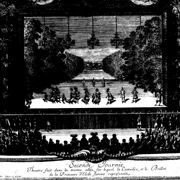New gems are constantly emerging from the large output of works by Jean-Baptiste Lully. The latest volumes of the Complete Edition are devoted to music theatre at court and church music for the sun king Louis XIV.
2010 saw the publication of a first volume of church music works, including full scores of the earliest of the motets, the Jubilate Deo, and the famous Te Deum; the corresponding vocal scores have been published recently. A recording of both works using these critical editions would be highly desirable. Also in 2010, the opera Thésée was published in the Complete Edition, which had been recently performed with great success at the Théâtre des Champs-Elysées conducted by Emmanuelle Haïm. The vocal score will be available in May 2011. With Thésée the librettist Philippe Quinault and Lully had forged new paths compared with earlier tragédies en musique. In this work, the military glamour with trumpets and drums stands at the centre, representing a counterpart to the tragedy of Medea’s role.
In 2011 two volumes will be published containing outstanding masterworks by Lully and Quinault, and Lully and Molière. The tragédie en musique Isis (recording: Les Solistes du Marais, La Simfonie du Marais, conductor: Hugo Reyne, Accord label) has occasioned a rich literature and some controversy because of the social and historical significance of its subject matter. Despite the scandal caused at court by the work – the jealousy of two women played out with brutality, in which the rivalry between two of the King’s mistresses could be recognised – the work remained in the repertoire for a long time because of its exceptional music, and had a great influence on Purcell and many other composers. A few of the shorter arias and dances from Isis became extremely well known. For example, the inspired music of the chorus of the ‘Trembleurs’ (people from the Frozen Climates whose teeth chatter in slurred tremolos) remained popular well into the 19th century in all levels of French society. Until recently, there was only a recording of excerpts from the opera in a production by the Pocket Opera Company Nuremberg; a concert performance was given in Britain some years ago.
The second volume to be published in 2011 is devoted to the two comédies-ballets by Molière and Lully: George Dandin "Grand Divertissement royal de Versailles" and La Princesse d’Elide. Both works were at the centre of one of the great celebrations which Louis XIV held in Versailles. The spectacle was staged from 7–9 May 1664 in the open air – even the theatre, with orchestral pit, was erected in the open air. The subject of the “galante comedy with music and ballet entrées”, La Princesse d’Elide, that was performed on this occasion was taken from Ariosto’s Orlando furioso. The stage sets by Carlo Vigarani were recorded in engravings by Israël Silvestre. Molière himself played the court fool Moron. Six intermedii close the acts in the comedy, and the third day of the celebration began with the Ballet du Palais d’Alcine, which concluded Princesse d’Elide.
In George Dandin Molière confronts two worlds. On the one hand, the audience saw an earthy social comedy with the class conflict between the aristocracy and the bourgeoisie reflected in the drama of Dandin, who wed Angélique purely out of ambition and without the slightest affection, and Angélique who was forced into marriage. This is contrasted with the pastorale of the four intermedii which deals with deeply-felt lovesickness and the joy of love. Molière succeeded in creating connections between these two worlds, the dreadful marital dispute and the pastoral sorrow and happiness of love. The author justifies Angélique’s dissolute life and her revolt against the objectionable Dandin. Staging these levels of conflict and contrast in a modern production is an extremely interesting and demanding task.
Whilst the manuscript of a further “divertissement royal”, Les Amants magnifiques, with text again by Molière, is almost complete and will be published next year, preparatory work on the tragédies en musique Amadis, Roland and Bellérophon and the magnificent court ballet Le Triomphe de l’Amour are also at an advanced stage. If any theatre is interest in staging any of these works, the editors and publisher can arrange for performance scores and vocal and orchestral materials to be prepared, given sufficient advance notice.
Herbert Schneider



